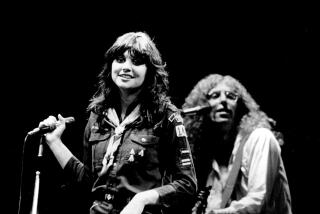JAZZ REVIEW : 1940s-Style Jam Session Comes Alive
“Gee, this is the oldest band I ever worked with,” said Flip Phillips on Saturday during KLON’s “Jazz at the Paramount,” produced by Ken Poston as a fund-raiser for the jazz-oriented radio station.
He may have been right; at 61, tenor saxophonist Allen Eager was the new young kid on the block. Yet what happened during this 1940s-style jam session was less a reliving of a lost past than an energetic reminder of an ongoing maturity.
The object was to simulate the ambiance of a Norman Granz “Jazz at the Philharmonic” concert. Everyone except Eager worked for Granz, including the entire rhythm section of Arnold Ross, piano; Herb Ellis, guitar; Red Callender, bass; and Alvin Stoller, drums.
Conspicuously missing was a trumpeter to lead the way; still, the front line of Eager, Phillips and the incomparable Buddy DeFranco on clarinet was powerful enough to sustain the excitement.
Succinctness was often the name of the game. These men came up during the 78 rpm record era, long before John Coltrane invented the 78-minute solo--one of history’s most questionable initiatives. Here is how “I Can’t Get Started” went: First chorus, 16 bars of Eager’s big, warm, smoke-filled sound, redolent of the great 52nd Street days; eight bars of Phillips, bolder and heavier, a Ben Webster through Eager’s Dexter Gordon; DeFranco for the last eight bars. Second chorus: DeFranco, 16 bars in a brief compelling voyage of adventure, then Ross for 16; third chorus split between Ellis and Phillips, and out. Moral: If you can’t tell your story in five minutes, you might as well stay home.
Eager’s presence--he had not been seen here in decades--was a particular joy. His blend of Lester and Dexter on “Body and Soul” was a reminder of the place he could fill on today’s scene, with so many of the tenor giants gone. Phillips showed his eternal youthful vigor on the “Perdido” finale; DeFranco moved from exquisitely-stated melody to superlative double-time blowing on “You’ve Changed.”
All the others soloed, but the horns took top honors, cooking on the blues as if there were no tomorrow but plenty of dues-building yesterdays.
The frenetic crowd reaction at the theater in the Paramount studio indicated the availability of a ready audience out there for music that builds on a noble tradition without ever wallowing in nostalgia.
More to Read
The biggest entertainment stories
Get our big stories about Hollywood, film, television, music, arts, culture and more right in your inbox as soon as they publish.
You may occasionally receive promotional content from the Los Angeles Times.










